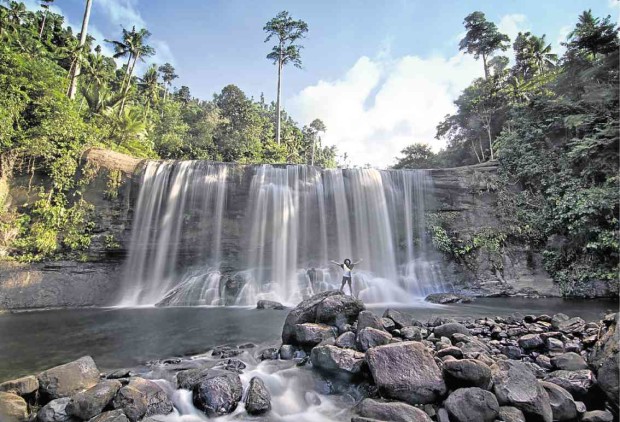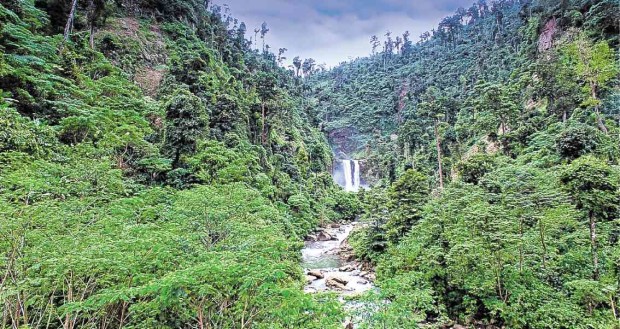Baganga’s secret waterfalls

Visitors who venture into Baganga town in Davao Oriental province are rewarded with a refreshing sight of Curtain Falls in Campawan village. —EDEN JHAN LICAYAN
BAGANGA, DAVAO ORIENTAL—Tucked up in the bosom of mountains hugging the provinces of Davao Oriental and Compostela Valley is a hidden paradise of cascading crystal-clear water that will surely draw nature-lovers and backpackers.
Less than an hour’s walk from the nearest Mandaya community in Campawan village in Baganga town in Davao Oriental, a 30-meter-high cataract (waterfall), known for its curtain-like drop, is an emerging magnet for tourists. It is aptly called Curtain Falls, its waters gushing several meters wide and tumbling down to an aqua lagoon ideal for taking a dip to beat summer’s sweltering heat.
The endless roar can be heard hundreds of meters away, a call too tempting to resist.
“This place is a delight for every tourist,” says Nenette Esteves, municipal tourism officer.
Being in Davao Oriental’s Pacific coast, Baganga has been known for its powdery-white sand beaches and picturesque islands and islets, but according to Esteves, the town has more to offer.
Article continues after this advertisementNot just sand and sea
Article continues after this advertisement“We want to tell tourists that our place is not just about the sand and the sea. We also have our beautiful waterfalls with its lagoon that even children will surely enjoy,” she says.
Slowly, Campawan’s secret gem, located 30 kilometers from the town center, is being unraveled to outsiders as the local government promotes Baganga to be another destination to its growing list of must-see areas for visitors.
Farther north is the more popular Aliwagwag Falls in Cateel town, which also offers a surge of thrill and adventure. The main waterfall is downstream of a river that snakes from the top of mountains separating Baganga and Maragusan in Compostela Valley, and cuts on the edges of Campawan, a farming community of over 2,000 people.
The trail leading to Curtain Falls is lined with lush ferns, shrubs and ancient tree stumps that serve as sturdy handrails when the path becomes slippery to trekkers after a night’s downpour. On sunny days, it is easy travel, accompanied by a cacophony of birds chirping and other forest sounds.
“Before, we used to hike 45 minutes from San Francisco,” says Esteves, referring to the community nearest to the falls. “With the opening of a road, getting to the falls became faster and easier.”
Easier access
Esteves says the local government has earmarked millions of pesos for infrastructure projects to boost tourism in Baganga, particularly around Curtain Falls.
The road from the highway to the drop-off point has been widened to allow vehicles to reach areas closer to the falls, according to Esteves. At the drop-off point, the local government is building a structure to house a tourism information center and washrooms and plans to put up gazebos, market stalls and a zipline across the river to give tourists a bird’s eye view of Curtain Falls.
Tourists who do not wish to bring basic provisions need not worry as stores in the community sell almost anything they need—from snacks to live chicken and soda to bottled water. Even gasoline in ubiquitous cola bottles can be bought, if one asks around.
The uphill-then-descending trail leads to the river where the imposing Curtain Falls plunges to a cool, white foam. Tourists can swim in the clear wide lagoon or shower under the surging drop while lounging on protruding boulders.
A wooden makeshift footbridge used to connect both sides of the river before it was swept away by a recent flood. Tourists now amble nimbly through the rocks to cross or wade through shallow areas.
‘Mother falls’
From Curtain Falls, another trail leads to the “mother falls,” actually a series of multiple cataracts that appear like a staircase, with the farthest step a kilometer or so.
Other waterfalls are still unexplored, Esteves says. Drone images obtained by Davao Oriental information office show several cataracts gushing on mountainsides, including twin cataracts that drop higher than Curtain Falls.
A waterfall, called “Moka-mokaon” by locals due to the abundance of an endemic species of white carnation flowers there, is rejuvenating after the devastation wrought by Typhoon “Pablo” (international name: Bopha) in 2012.
Esteves says huge boulders pushed by the raging river clutter the area, making the falls not too appealing to tourists. Almost five years after the disaster, nature is slowly restoring Curtain Falls to its pristine natural wonder.
“We’re also doing improvements but in such a way as not to destroy the environment,” the tourism officer says.
With the opening of Curtain Falls to tourists, “the local government intends to make Baganga a complete tourist destination,” she says.

